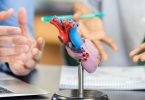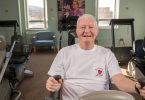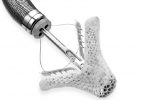The faster a heart attack is diagnosed and treated, the higher the likelihood of survival. Yet not everyone who has a heart attack will have classic chest pain (angina). The absence of this symptom could cause them to delay seeking treatment.
Deborah McNamee of Susquehanna County, Pa., discovered this after her 2016 summer vacation was interrupted by what she thought was routine gallbladder trouble. She felt off-and-on pressure on the right side of her chest under her rib cage, along with some nausea. “It was uncomfortable, like a fist pressing on me, but not painful, and not near the center of my chest.”
Although she expected the symptoms to subside, Ms. McNamee and her husband, Denis, decided to drive home early from Vermont as a precaution. When she woke up the next morning with more discomfort and nausea, Mr. McNamee and a co-worker persuaded her to go to the hospital.
IS IT A HEART ATTACK?

Classic chest pain is not always present during a heart attack, and anyone — both men and women — may suffer atypical symptoms. If you suffer one or more of the following symptoms, even if you’re not sure it’s a heart attack, call 911.
- Breaking out in a cold sweat
- Dizziness or light-headedness
- Discomfort in the upper body, which may include pain in one or both arms, shoulders, neck, back or jaw
- Chest pain, pressure, fullness or discomfort that may remain steady or come and go
- Shortness of breath with or without chest discomfort
- Fatigue or weakness
- Unexplained nausea or vomiting; indigestion
*Most common symptoms
*Other possible symptoms, especially if accompanied by a common one
At UHS Wilson Medical Center’s Emergency Department, blood tests indicated that her symptoms were manifestations of a heart attack. Emergency coronary angiography was performed and she was diagnosed with blockages involving four major heart arteries. A quadruple bypass was recommended, and Ms. McNamee remained hospitalized until surgery was performed about a week later, on August 1, by UHS cardiothoracic surgeon Kenneth Wong, MD.
Ms. McNamee had no idea her condition was so precarious — in fact, it became acute once she arrived at the hospital. “It still feels surreal to me,” says the 65-year-old registered nurse, who has since retired from her job as a nutritional counselor. “If I had waited longer, the outcome could have been much worse. I encourage anyone with new or troubling symptoms of any kind to call 911 right away.”
In a heartbeat
UHS provides fast, life-saving response to heart attack symptoms. The median time from a patient’s arrival at UHS Wilson to cardiac catheterization, when needed, is 61 minutes, beating the national goal of 90 minutes. “The entire process, from stabilization to diagnosis and treatment, is streamlined,” says Paul Traverse, MD, interventional cardiology medical director. “We can view patient data while you are still in the ambulance. The cardiology team is notified and the catheterization lab is prepared before you arrive.”
That fast response applies to rural patients as well. Those who arrive at UHS Delaware Valley Hospital or UHS Chenango Memorial Hospital and are diagnosed with an acute myocardial infarction are swiftly transported to UHS Wilson Medical Center via ambulance or helicopter and are met by a team of physicians and nurses for immediate intervention.
Of course, patients have these advantages only if they seek care. “It’s crucial to call 911 when you recognize or suspect heart attack symptoms,” says Keyoor Patel, DO, FACC, who was recently named director of echocardiography at UHS. “The faster you get to us, the faster we can stabilize and treat you before your condition worsens. Remember, time is muscle.”
Heart healthy
Ms. McNamee says it was comforting to have the quick-acting UHS cardiac catheterization team members by her side during diagnosis. “Though they had to deliver bad news, they were very professional and answered all of my questions.”
Ms. McNamee has recovered from her surgery and says she’s feeling healthy after completing cardiac rehabilitation at UHS. She now takes advantage of the Health and Wellness personalized exercise program and gym at UHS Binghamton General Hospital, staffed by trained professionals. “I feel safe knowing that if I have questions or a problem such as shortness of breath, I’m in good hands.”
Her story has inspired many of her friends to visit their doctor and get a heart health checkup. It has also inspired her to volunteer as a Go Red for Women spokesperson. “If in doubt, call 911,” Ms. McNamee says. “It could save your life.”
Support group for cardiac patients

Deborah McNamee, who had a heart attack and open heart surgery in 2016, says the experience has made her do some soul-searching. “After an event like that, I had to figure out who I was again,” she says.
She’s not alone. Living with a heart condition can be life-altering. The Mended Hearts support group at UHS provides an opportunity to get the help and encouragement needed to improve your quality of life or that of a loved one.
Meetings cover a variety of subjects, such as how to manage medication, navigate insurance, plan a heart-healthy diet and exercise safely. Guest speakers, including physicians, dietitians and other professionals, offer advice and information, and members have time to socialize and compare strategies for coping with everyday challenges.
Mended Hearts’ volunteer leaders and members have all had personal experience with heart disease. Family members are highly encouraged to attend Mended Hearts as well.
When: The fourth Monday of every month
Contact: 785-3019







